William Ruto and the evangelicals
Which theology we will use to make sense of the relationship between church and state in Kenya?

Image via the World Trade Organization on Flickr CC BY-SA 2.0.
When William Ruto won the 2022 general elections to become Kenya’s fifth president, local and international media were awash with discussions of Ruto as an “evangelical president.” The excitement, however, was informed less by Kenyan religion or politics and more by right-wing evangelicals in the US and their war on homosexuality and abortion. Kenyan intellectuals, largely educated in Western liberal values and human rights discourse, also focused on concerns about secularism and for the rights of women and sexual minorities in Kenya.
Much of this analysis misses major nuances of religion and politics in Kenya, and comes from rigid adherence to the Eurocentric framework in which religion represents the conflict between traditional monarchical fascist conservatism on the one hand and liberal secularism and anti-religion left politics on the other.
For people of African descent, expressions of faith are not tied to monarchies and republics but to liberation. For the last four centuries, freedom has been the fundamental spiritual and religious preoccupation of Africans on the continent and in its diaspora. The spark of the Haitian revolution was the Boukman prayer, where the proclamation of freedom appealed to the God “who orders us to revenge our wrongs,” and against “the white man’s god who is so pitiless.” In Africa, Kimpa Vita, Simon Kibangu, Elijah Masinde and Lucas Pkech are some of the Africans who used contrapuntal readings of scripture in resisting colonialism.
The civil rights movement in the US followed the same tradition, for both Martin Luther King and Malcolm X grounded their struggles in faith. If anything, the modern articulation of right-wing, white evangelicalism is a reaction to the impact of the liberation theologies of the 1960s and 1970s in the US. Led by figures like Paul Weyrich, the right wing actively sought the collaboration of American evangelicals to fight against the gains of the civil rights movement without mentioning politics or race. To counter desegregation of schools, the new alliance offered homeschooling and faith schools. In the place of diversity and social welfare, it offered family values. Against the political gains of women, it turned abortion into a rallying cause.
But rather than confront the capture of theology, the acolytes of Enlightenment (i.e. liberals), offer reason, human rights and landmark court cases, hinting that religion automatically makes one a conservative, and implying that peoples of the Global South who want to harness religion have failed to decolonize their minds. The silence that they impose on emancipatory readings of religion has allowed space for right-wing, anti-political and hateful theology to gain momentum, which has culminated in the capture of the US Supreme Court. Instead of learning their lesson and removing the Eurocentric walls around religion, these intellectuals now try to force African politics and religion into restrictive Eurocentric boxes of constitutionalism and human rights activism.
This hubris is oblivious to the fact that any interpretation of religion is fundamentally political, because interpretation informs and is informed by decisions we make in society. And this reality is not affected by secularism, for as the Kenyan historian Ali Mazrui once wrote, the separation between the church and the state does not necessarily translate into a separation between religion and politics. Blocking discussions of religion is political as well, but its effect is to depoliticize people by imposing moral conversations (the goodness of individuals) where there should be political ones (what people should do about power).
A large part of this oversimplification of religion emanates from the Euro-American liberal discomfort with knowledge outside of the rational. Religion and spirituality allow more space for ambiguity, fluidity, contradiction, and intersection, which is inconvenient for forms of power and knowledge that rely on the letter of the law, precision, and empirical proof. Add to that racism, which is notoriously impatient with appreciating Africans as complex human beings, and you have a potent mix that misreads African political theology.



